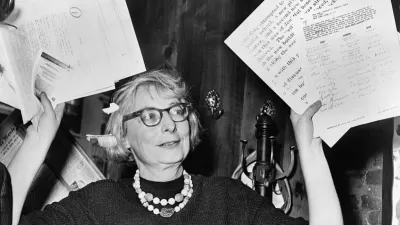Jane Jacobs, often viewed as the patron saint of the progressive urban planning world, maybe be given too much credit, according to this piece from Andrew Manshel.
"Her views have now been broadly adopted and it is conventional wisdom in planning circles that participatory neighborhood planning is best, that preservation of old buildings is essential, and that in cities the car is bad. But Jacobs had a tendency toward sweeping conclusions based on anecdotal information, and some of them were overblown and/or oblivious to the facts. Perhaps most graphically, Jacobs predicted that the grand arts center planned for the Upper West Side of Manhattan would fail. But Lincoln Center turned out to be a great success-igniting the revitalization of the entire neighborhood.
More revealingly, the Greenwich Village she held out as a model for city life has become some of the highest-priced real estate in New York City-it's no longer the diverse, yeasty enclave she treasured. Ultimately, many of the policies she advocated blocked real-estate development-causing prices of existing housing stock to rise and pricing out all but the wealthiest residents."
Manshel suggests that more attention be given to the ideas of William H. Whyte.
FULL STORY: Enough With Jane Jacobs Already

Maui's Vacation Rental Debate Turns Ugly
Verbal attacks, misinformation campaigns and fistfights plague a high-stakes debate to convert thousands of vacation rentals into long-term housing.

Planetizen Federal Action Tracker
A weekly monitor of how Trump’s orders and actions are impacting planners and planning in America.

In Urban Planning, AI Prompting Could be the New Design Thinking
Creativity has long been key to great urban design. What if we see AI as our new creative partner?

King County Supportive Housing Program Offers Hope for Unhoused Residents
The county is taking a ‘Housing First’ approach that prioritizes getting people into housing, then offering wraparound supportive services.

Researchers Use AI to Get Clearer Picture of US Housing
Analysts are using artificial intelligence to supercharge their research by allowing them to comb through data faster. Though these AI tools can be error prone, they save time and housing researchers are optimistic about the future.

Making Shared Micromobility More Inclusive
Cities and shared mobility system operators can do more to include people with disabilities in planning and operations, per a new report.
Urban Design for Planners 1: Software Tools
This six-course series explores essential urban design concepts using open source software and equips planners with the tools they need to participate fully in the urban design process.
Planning for Universal Design
Learn the tools for implementing Universal Design in planning regulations.
planning NEXT
Appalachian Highlands Housing Partners
Mpact (founded as Rail~Volution)
City of Camden Redevelopment Agency
City of Astoria
City of Portland
City of Laramie





























